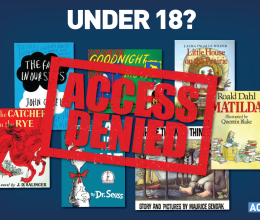BATON ROUGE, La. — On Friday, October 7, Chief Judge Brian A. Jackson of federal district court signed an order permanently preventing Louisiana from enforcing a 2015 Louisiana law that required websites to age-verify every Internet user before providing access to non-obscene material that could be deemed harmful to any minor. Judge Jackson had previously granted a preliminary injunction in the case, Garden District Book Shop v. Stewart. The state then determined that it would not defend the constitutionality of the law and agreed to the entry of a permanent injunction.
The plaintiffs in the case are two independent booksellers, Garden District Book Shop and Octavia Books; Future Crawfish Paper LLC, publisher of Anti-Gravity magazine; the American Booksellers Association; and the Comic Book Legal Defense Fund. The lawsuit was brought by the Media Coalition and the American Civil Liberties Union.
The law, enacted as H.B. 153, required that “any person or entity in Louisiana that publishes material harmful to minors on the Internet shall, prior to permitting access to the material, require any person attempting to access the material to electronically acknowledge and attest that the person seeking to access the material is eighteen years of age or older.” A failure to age-verify, even if no minor ever tried to access the material, would have been a crime subject to a $10,000 fine. Louisiana has a separate law that makes it a crime to lie when asked to acknowledge or attest to anything.
To comply with the law had it not been enjoined, booksellers and publishers would have had either to place an age confirmation button in front of their entire websites, thereby restricting access to materials that may be appropriate for all ages, or to attempt to review all of the books or magazines available at their websites and place an age confirmation button in front of each individual page that might be inappropriate for any minor.
The federal district court found in its preliminary injunction ruling that “[t]he ill-defined terms in [H.B. 153] do not adequately notify individuals and businesses in Louisiana of the conduct it prohibits, which creates a chilling effect on free speech.”
“This is an important victory for me as a bookseller and for my customers,” said Tom Lowenburg, co-owner of Octavia Books. “This law would have placed an impossible burden on our website by forcing us to ‘ID’ every person who visited the site before allowing them to browse our books or risk getting a $10,000 fine.”
"I'm very relieved by the decision. This law would have had a definite chilling effect on our business, depriving our customers of books that they have a First Amendment right to browse and buy,” said Britton Trice, owner of Garden District Book Shop.
“We are thankful for the court’s decision to permanently block this law that would have forced booksellers and publishers to restrict access on their online stores to what is acceptable for a 12 year old,” said David Horowitz, the executive director of Media Coalition. “The court agreed that parental controls are a more effective and less restrictive way for parents to limit their kids’ access to sexual material on the Internet without violating the First Amendment rights of adults and older minors.”
“The court’s decision is a welcome recognition that the law’s online age-verification requirements impose burdens on publishers and Internet users and create a chilling effect on the exercise of free speech rights,” said Esha Bhandari, a staff attorney with the ACLU’s Speech, Privacy, and Technology Project.
Plaintiffs are represented by Bhandari and Lee Rowland of the national ACLU, Justin P. Harrison and Stephen Dixon of the ACLU of Louisiana, and Michael A. Bamberger and Richard M. Zuckerman of the law firm Dentons US LLP, general counsel to Media Coalition, Inc.








